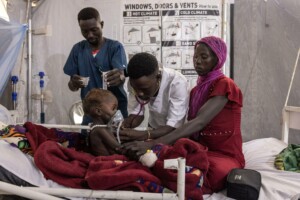UN assessment: Food security concerns in a third of Sudanese households
Despite a good 2018-2019 harvest in Sudan, a high level of food insecurity persists, according to the Comprehensive Food Security Assessment (CFSA) 2018 report. Millet and sorghum prices soared particularly in April.
The CFSA 2018, recently released by the UN World Food Programme in collaboration with the Sudanese state ministries of agriculture, was conducted from November 2018 to February 2019 against the ongoing economic instability.
 A Darfuri mother with her children and goats (globalgiving.org)
A Darfuri mother with her children and goats (globalgiving.org)
Despite a good 2018–2019 harvest in Sudan, a high level of food insecurity persists, according to the Comprehensive Food Security Assessment (CFSA) 2018 report. Millet and sorghum prices soared particularly in April.
The CFSA 2018, recently released by the UN World Food Programme in collaboration with the Sudanese state ministries of agriculture, was conducted from November 2018 to February 2019 against the ongoing economic instability.
A total of 29,088 household interviews were completed in 143 localities across 13 states, the UN Office for the Coordination of Humanitarian Affairs (OCHA) in Sudan reports in its latest bulletin.
Economic vulnerability – inability to afford food due to high prices – remains one of the major reasons behind household food insecurity, with 77 per cent of the households economically vulnerable. The food insecurity is expected to remain high at least until September, which is the end of the lean season.
At least 25 per cent of the households surveyed do not consume a proper diet, where 20 per cent did not consume Vitamin A rich foods and 30 per cent did not consume hem-iron (iron that comes from animal proteins) exposing them to the risks of micro-nutrient deficiency.
In the 13 states surveyed, 31 per cent of households were found food insecure. More than half of households were found to have spent at least 75 per cent of their household expenditure on food and are unable to create or invest in livelihood assets. The average monthly household expenditure doubled since 2017 forcing 30 per cent of households to spend savings.
In addition, more than one-third of the households had to adopt coping strategies to maintain minimum food consumption levels. Moreover, 54 per cent of households had to resort to livelihood based coping strategies, depleting their livelihood assets.
About 58 per cent of children between 6-59 months lacked diversity in their diets and 77 per cent of children aged 6-23 months did not eat enough meals. Only nine per cent of children aged 6-23 months met the minimum acceptable diet criteria.
Soaring millet and sorghum prices
Prices of locally-grown sorghum and millet increased in most markets in Sudan in April, according to the Food and Agriculture Organization (FAO) latest Food Prices Monitoring and Analysis (FPMA) bulletin.
By contrast, prices of wheat grain declined by 10-15 per cent in several markets, including Khartoum, following the recent harvest. Overall, prices of grains were at record or near-record levels in March despite an above-average 2018 harvest, which is estimated at 8.2 million tons, 57 per cent up from 2017 and 47 per cent above the average of the previous five years.
The exceptionally high level of prices is the result of the significant depreciation of the local currency, which continues to lose value in the parallel market, fuel shortages and soaring prices of agricultural inputs have inflated production and transport costs.
Despite the good output last year, market availability is low, with traders reportedly storing the agricultural produce, regarded as a more reliable form of savings compared to the weakening currency.
Political uncertainty and heightened social unrest since March exerted further inflationary pressure on prices.
FAO’s Crop and Food Supply Assessment Mission (CFSAM) report issued in March estimates Sudan’s cereal supply and demand for 2019 as below:

Our editorial independence means that we can continue to provide factual updates about ongoing protests to Sudanese and international actors, educate people about how to avoid outbreaks of infectious diseases, and provide a window to the world for those in all corners of Sudan. Support Radio Dabanga for as little as €2.50, the equivalent of a cup of coffee.












 and then
and then